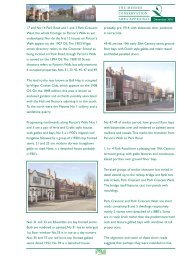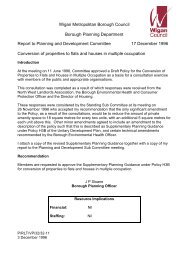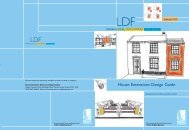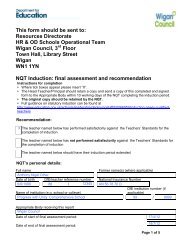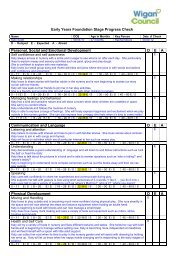A1P (1) MAJOR HIGHWAY SCHEMES - A5225 ... - Wigan Council
A1P (1) MAJOR HIGHWAY SCHEMES - A5225 ... - Wigan Council
A1P (1) MAJOR HIGHWAY SCHEMES - A5225 ... - Wigan Council
You also want an ePaper? Increase the reach of your titles
YUMPU automatically turns print PDFs into web optimized ePapers that Google loves.
10.96 If only the transport schemes which are already committed in <strong>Wigan</strong> are<br />
implemented (the do minimum scenario) traffic levels on the A577 corridor would rise by<br />
between 3% and 37% by 2011. By 2026 growth of between 11% and 97% is forecast.<br />
The implementation of the scheme would result in a reduction of traffic flows on all<br />
sections of the A577 to the extent that they would be below present levels in both 2011<br />
and 2026. This reduction in traffic is intended to provide opportunities to improve<br />
accessibility by bus, cycling and walking along the existing A577 corridor.<br />
10.97 Objectors note that a Transport Assessment has not been prepared and presented<br />
in evidence at the inquiry. PPG13 (paragraph 23) advises, however, that where<br />
developments will have significant transport implications, Transport Assessments should<br />
be prepared and submitted alongside the relevant planning applications for development.<br />
It is clear, therefore, that such an assessment is relevant to the planning application stage<br />
when the detail of the proposal will be considered, rather than to the safeguarding of land<br />
in a development plan.<br />
10.98 RPG13 (paragraph 10.3) provides that constructing new roads to<br />
accommodate future traffic growth is neither environmentally nor economically<br />
sustainable. Objectors argue that the building of new roads is not the answer to problems<br />
of traffic growth and congestion. In particular, they contend that the construction of the<br />
<strong>Wigan</strong> and Hindley Bypass would significantly increase traffic levels on what are already<br />
congested sections of the existing road network at the eastern end of the Borough,<br />
particularly on the A579 road between Leigh and Atherton and on the network of existing<br />
roads that link this latter settlement to West Houghton and to the M61 motorway in the<br />
adjacent district of Bolton. They contend that this would happen with the alignments<br />
proposed at both FDD and RDD stages.<br />
10.99 Quoting from the foreword to the document ‘The Future of Transport: A<br />
Network for 2030’ (published in July 2004) they assert that ‘we cannot simply build our<br />
way out of the problems we face with transport’. That document did, however, recognise<br />
the role of bypasses in tackling the worst areas of congestion.<br />
10.100 The LPA argues that the proposal to safeguard land for the road is not<br />
intended simply to accommodate traffic growth. It is, instead, intimately connected with<br />
the proposed location of the employment sites which it is to serve. If these are to be<br />
located within or adjacent to the built-up area, in conformity with national and regional<br />
guidance, the traffic they generate will inevitably impact on the roads in their vicinity.<br />
10.101 A proportion of that traffic, both HGVs and travel to work journeys by<br />
employees, would be influenced by origins and destinations at and beyond the eastern<br />
end of the Borough, regardless of whether the new road was built or not. The only way to<br />
avoid such an increase in traffic would be to not make the employment allocations<br />
themselves, or to concentrate the majority of them at the western end of the Borough.<br />
Given that the first key objective of RPG13 is to achieve greater economic<br />
competitiveness and growth, such allocations must clearly be made. Given the need to<br />
maximise accessibility to jobs while minimising the use of vehicular transport, a<br />
414









